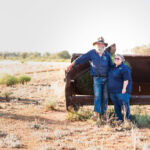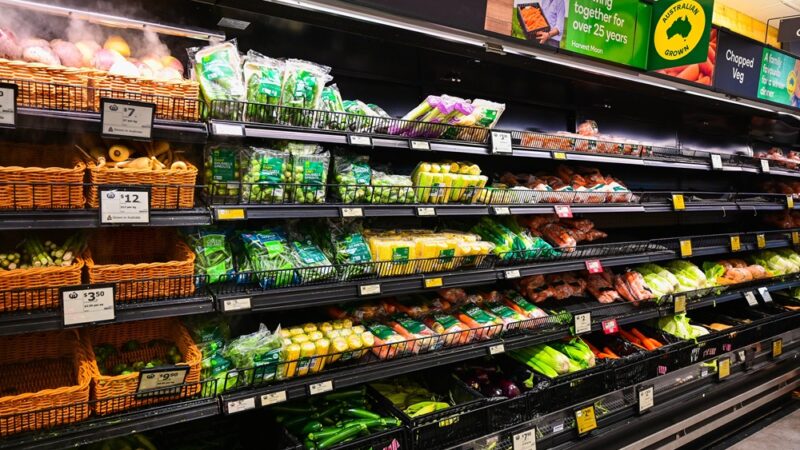Ian Edson has been connected to the outback soils of the Ivanhoe district since he…
Three tales from tea tree farmers
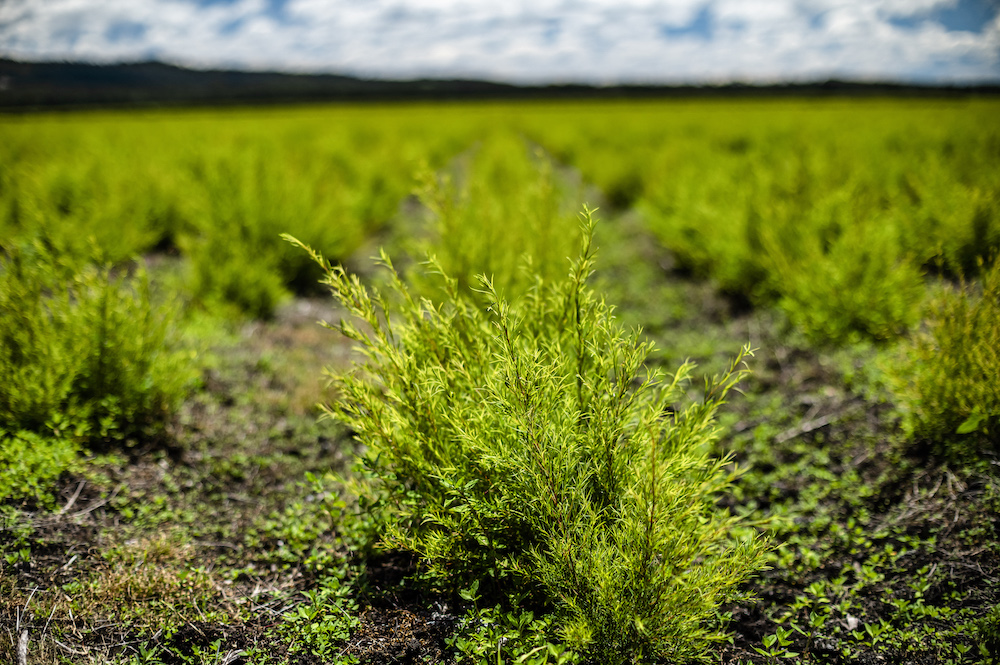
The coastal littoral zone of northern NSW is some of the most beautiful country in the world. It’s also home to most of the 140 producers of pure Australian tea tree oil
Between them they distil around 1,000 metric tonnes per year from their 5,000 hectares. Small and niche they may be, but they’re also amongst the most proactive farmers in Australia – with good reason.
“If you get into this industry, you have to be prepared to invest,” says Phil Prather, President of the Australian Tea Tree Industry Association (ATTIA).
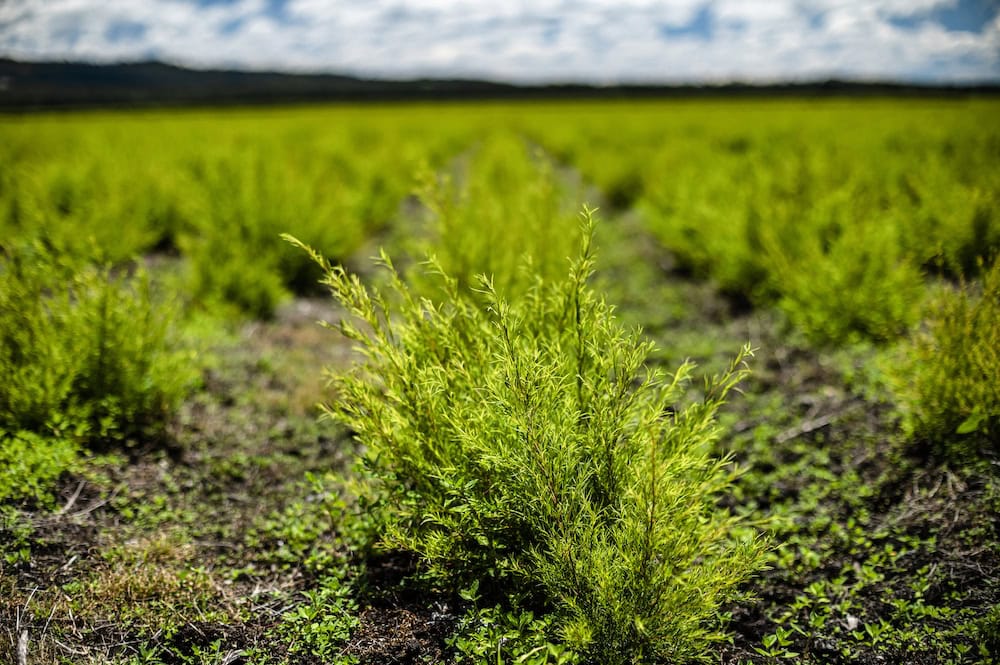
Since 2009, members have, via a voluntary levy, invested in research, marketing and quality control initiatives with one of their first concerns to deal with imposters. That’s important because, at best, adulterated or fake products will prove ineffective. At worst, they could injure people.
ATTIA’s first response was to introduce a quality control (QC) program and logo, a bit like the Woolmark.
“No other essential oil in the world has its own QC program. It governs every aspect of production including seed selection, land development, harvesting, distillation, packaging and the documentation that ensures growers can answer any quality issues down the track.”
Phil Prather, President of Australian Tea Tree Industry Association
ATTIA even goes as far as buying ‘tea tree oil’ off shelves all over the world and bringing it back to Southern Cross University for testing. Much of it isn’t even tea tree at all – it’s pine or eucalyptus.
ATTIA needs to stay on top of that because pure and genuine tea tree has unique anti-microbial, anti-fungal, anti-inflammatory properties which make it quasi-medical. Indeed, it if wasn’t for the challenges of how regulatory bodies work, it would be well-qualified as a medical product.
The problem is that these regulatory bodies like one active ingredient, one function and one result. Tea tree is a natural composition of at least 149 compounds.
Mind you, that hasn’t stopped others producing poor research – another expense for ATTIA which then has to debunk it, a recent example being the claim that it caused endocrine disruption.
Members are constantly updated on findings with research databases and newsletters but it must be frustrating to have time and money sucked out of positive research projects such as the indications that tea tree may have a role in treating non-melanoma skin cancers, herpes simplex and scabies.
It was even tricky to promote its anti-viral properties in the fight against Covid-19. Everyone knew the bench wipes and hand washes worked well and there’s a gel-based formulation that slowly disperses tea tree into the air.
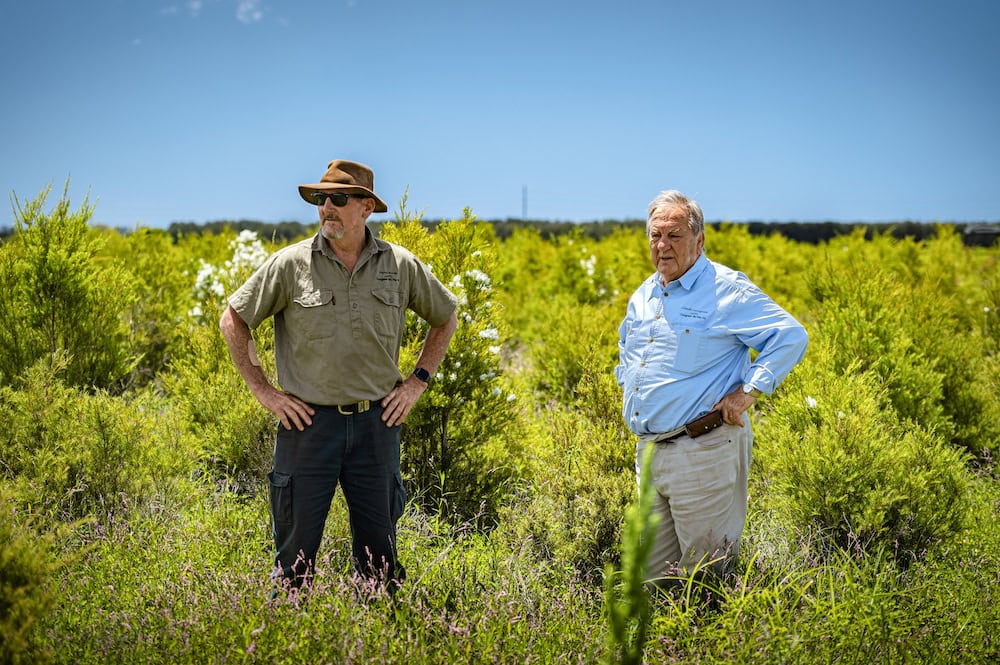
“You don’t really smell it, but it cleanses the room and studies from Griffith University found it highly effective against viruses,” says Phil.
“However, as soon as you say you’re killing something, it becomes a biocide or anti-microbial and that’s when the regulatory authorities want to get involved.”
It sounds very difficult, and the recent floods haven’t helped. Tea tree plants love water but not that much. Why do the tea tree producers persist?
“It’s a fantastic industry. We love it,” says Phil. “My background is in medical devices. I’ve got a familiarity with medical information and regulatory bodies and we will get there. We just have to ensure we put all the right pieces in place.”
Meet the people behind the tea trees
Claude Cassegrain owns Cassegrain Kalara tea tree plantation near Port Macquarie, and he acquired his tea tree plantation by default.
“I was holding onto the block of land intending it to be used for a regional airport!” he says. “It already had tea tree plants on it so when that scheme fell through in 1993, I started work on a new business plan.”
The property is 630 hectares and Claude and his team planted 400 trees.
“In 2000, we opened our distillery and it wasn’t until we were about to start our first harvest that we realised there were another 4,000 to 5,000 hectares of tea tree planted all the way up to Queensland,” he says. “I had no idea, or I wouldn’t have even started!”
At the same time, Germany – which had been their biggest market – stopped buying tea tree oil so suddenly the market collapsed and many people lost everything.
“We mothballed and were saved in 2004, when Canada developed as a market,” says Claude. “It took us until 2008 to become profitable again and gradually the price increased.
“However, we had all learned from the year 2000, and from then, tea tree growers started to become more cooperative and share information.”
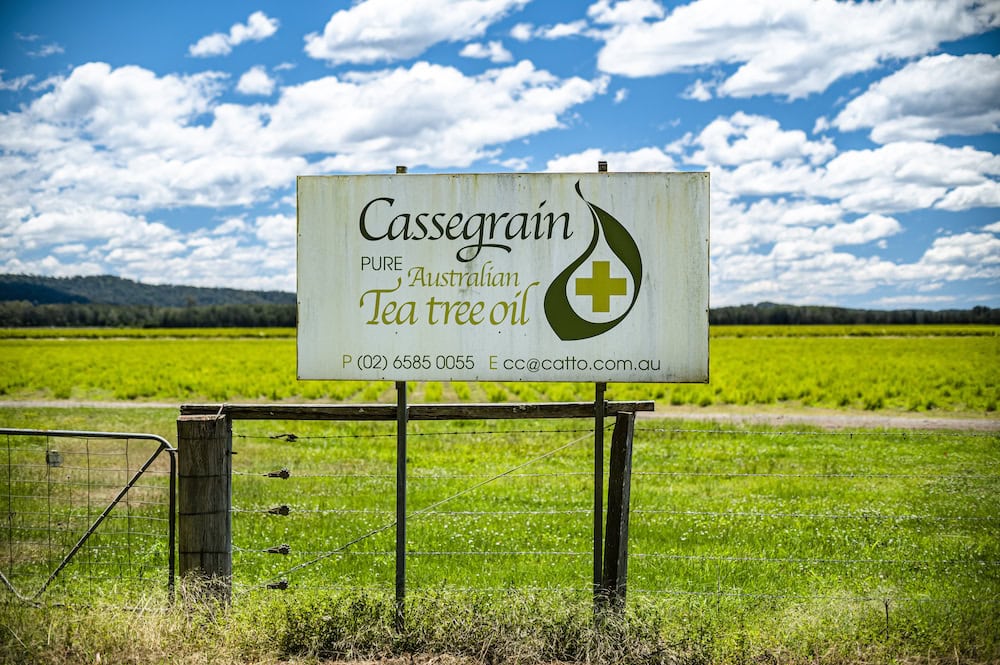
Meanwhile, Claude worked on growing their market, using AusTrade to help identify potential customers and build a reputation for reliability. “We now sell all over the world including to South America, India, Japan and Europe,” he says. “The primary use is for cosmetic and pharmaceutical products, and our annual record was distilling 120,000 kilos.”
Claude’s operation is the most southern plantation in Australia. “And we record every batch we distil – where it came from, time of harvest and cook, so we have traceability,” he says. “We provide good service and quality control so tend to average around $50 per kilo.
“We have a few projects underway to improve that quality further, including a high quality seedling trial on our plantation under the supervision of Dr Mervyn Shepherd from Southern Cross University.”
Claude says that the biggest issue for them, is realising the potential of tea tree oil.
“If we can get the TGA to adopt new methodologies to accept natural projects, that’s when tea tree oil will really take off. We need to invest more in research and market development. Tea tree oil is a rare, special precious commodity and so it should be treated as such.”
Claude Cassegrain, tea tree producer
From theatre to tea tree farming
Morgan Dowsett has a Kimulli tea tree oil plantation near Woodburn.
“My parents Stephen and Adele bought this tea tree farm in 1995, and at the time, it looked like a tremendous opportunity,” he says. “Prices were sky high at $80 a kilo, but five years later they crashed to around $8 a kilo.”
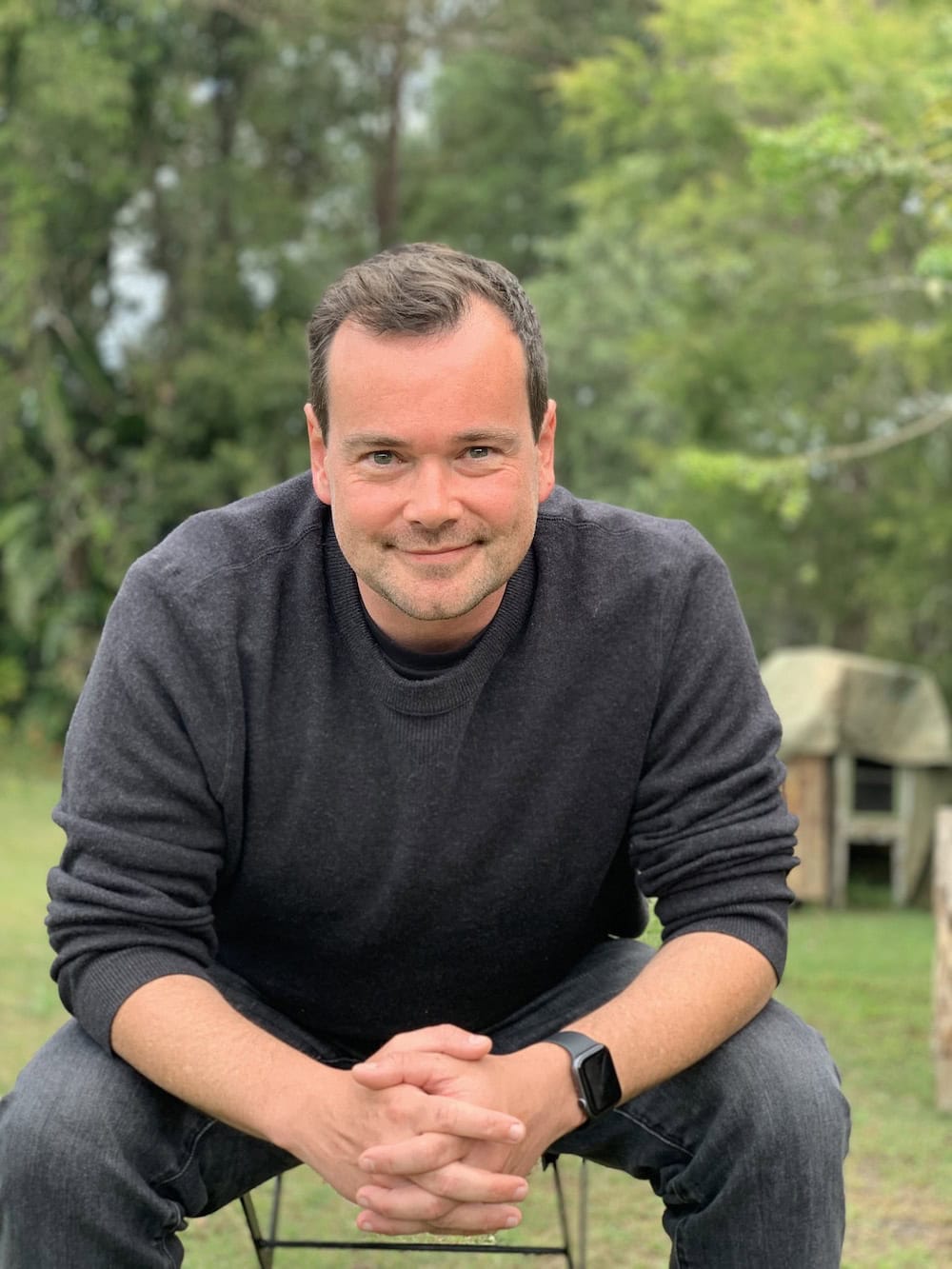
Morgan was living overseas at the time, working in theatres all over the world, but he ended up back on the farm when his father died suddenly in 2018.
“Mum had breast cancer at the time and they’d both put so much effort into it, I promised her I’d keep the place going,” he says.
“I knew little about farming, but I got in touch with his Dad’s contacts, including Peter Entwistle – the main agronomist for tea tree in Australia, and he guided me.”
Morgan had always enjoyed sciences and he soon realised why his father had given up an international career in commodities, to be a farmer and work with tea tree oil.
“I also realised I was walking in his shoes in a way that was a grieving process for me and really made me appreciate him,” Morgan says. “The more I got into it, the more I loved it too.”
When Morgan’s mother died in 2020, he and his sister Naomi took it over as a family business.
“We now want to take it to another level and create a name and brand behind the plantation,” he says. “To learn as much as I can, I’m now on the board of directors for ATTIA. One of the things I hope to do is organise a tea tree festival in nearby Coraki which used to be the capital of tea tree.”
The idea is to invite local plantations and people who sell tea tree oil products, so the two sides of the supply chain can build rapport and help marketing. “We can share our stories so they can explain how they source their tea trea and build up the notion of a terroir, as they do in wine,” Morgan explains.
“I helped establish the New York International Fringe Festival so setting up a festival in Coraki shouldn’t be too hard. It’s a uniquely Australian story and there’s a lot of interest in agritourism.
“I made a big jump in my life taking on this plantation but we’ve got 62.5 hectares planted now, producing around 10 tons of oil a year. I’ve learned to drive a tractor, spray, slash… I can do pretty much everything now. I should even have some free time to return to theatre work soon as well!”
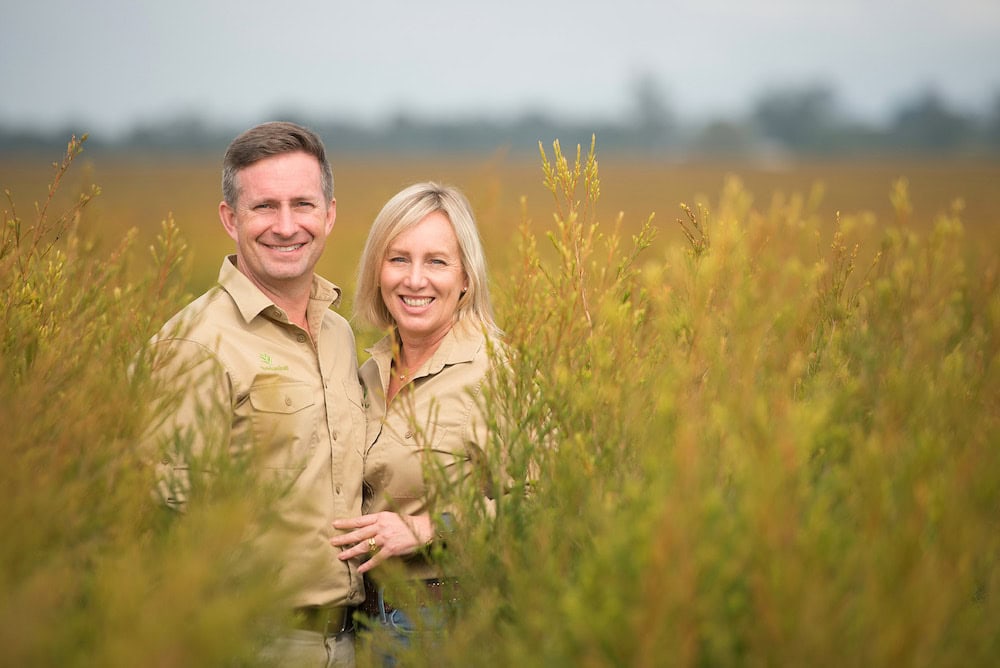
Tea tree with sustainable goals
Phil Prather has Down Under Enterprises in the Northern Rivers.
“We’ve owned our farm since 2016 but my wife DeeAnn is a sixth-generation farmer and her family has been involved for more than 25 years,” he says. “They were dairy farmers before that. We came back to Australia from America to help them and loved the industry so much we bought our own place, now one of the most modern tea tree farms in the industry.”
The couple have over 5.5 kms of irrigation pipes around 18 inches in diameter on their farm, which means they can move a lot of water around quickly and remotely. Although it did get hit by floods, it’s designed so water will also flow off.
“At present we produce north of 30 tons of oil a year, but also market on behalf of local growers so in excess of 120 tons globally to customers around the world, usually on a repeat business under contract,” Phil explains.
“More recently we’ve branched into other Australian essential oils including lemon and lavender-scented tea tree and lemon and anise myrtle. They’re also anti-bacterial, anti-fungal and anti-inflammatory.”
“As far as I’m aware, what makes us unique is we’re the only farm to have pursued sustainability goals.”
Phil Prather, tea tree grower
They’ve attained platinum status with EcoVardis – an independent sustainability auditor which puts them in the top one per cent of over 100,000 companies on that platform globally.
“That is not a cost minimisation strategy, but because consumers are holding companies to account on their sustainability footprint,” Phil says. “Those who are investigating the supply chain, making sure they’re clean, they’re the types of customers we work with.”
If you enjoyed this story about tea tree growers, you might like to read this feature on our robust olive industry.


